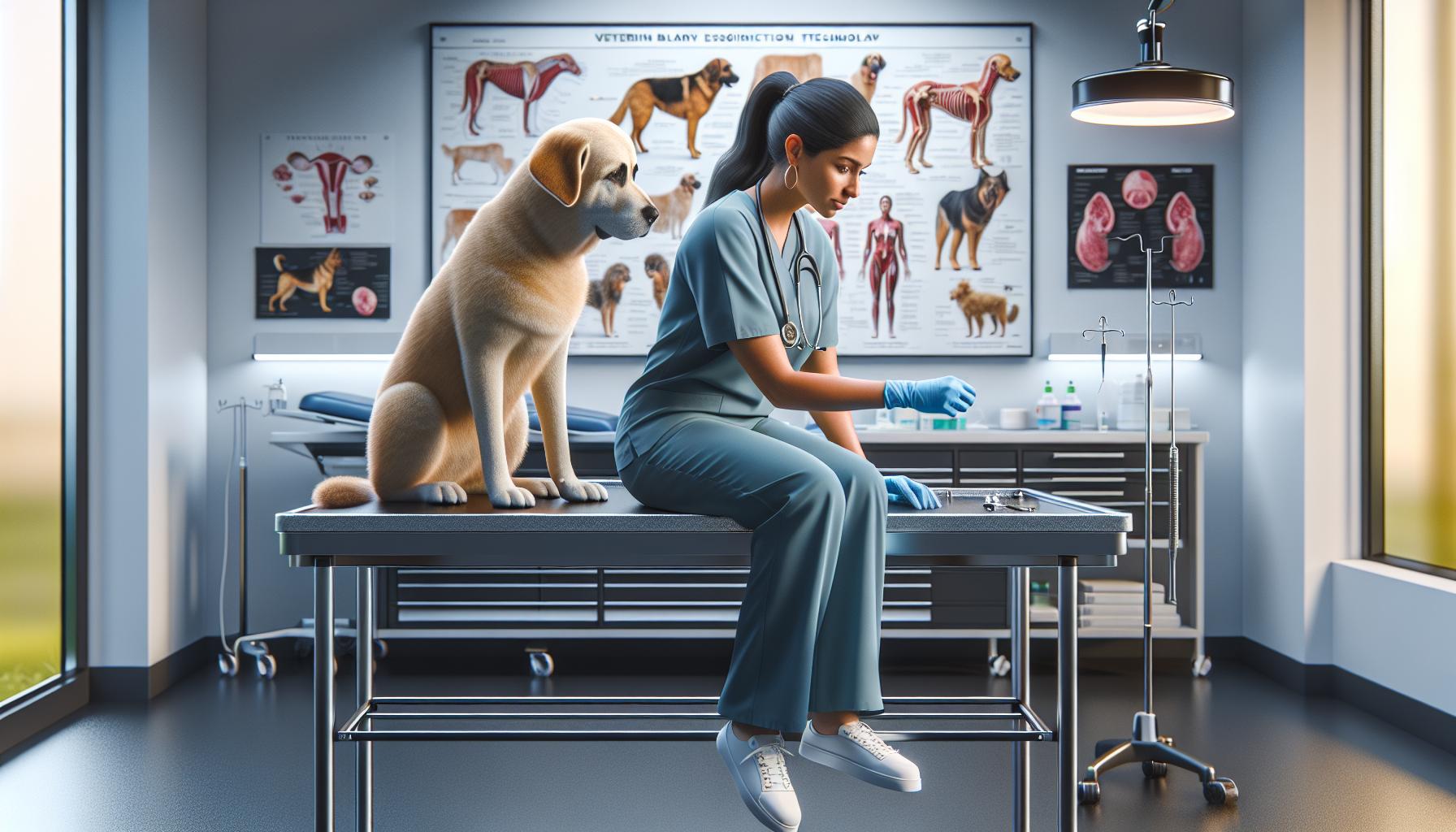Becoming a veterinary technician offers an exciting career path for animal lovers who want to make a difference in pet healthcare. These skilled professionals work alongside veterinarians providing essential medical care to animals in clinics hospitals and research facilities. While the journey to becoming a vet tech requires dedication the educational requirements are more straightforward than those for veterinarians. Most states require completion of an accredited veterinary technology program which typically leads to an associate’s degree. The combination of classroom learning hands-on training and clinical experience prepares aspiring vet techs for the challenges of animal healthcare.
What Education Do You Need To Be A Vet Tech
A veterinary technician serves as a skilled healthcare professional who assists veterinarians in providing medical care to animals. These professionals function similarly to nurses in human healthcare settings, performing essential clinical tasks under veterinary supervision.
Key Responsibilities and Duties
Veterinary technicians perform diverse clinical tasks in animal healthcare settings:
- Collect laboratory samples including blood, urine specimens
- Administer medications prescribed by veterinarians
- Monitor vital signs of animals under treatment
- Take diagnostic x-rays following established protocols
- Assist during surgical procedures by:
- Preparing surgical instruments
- Monitoring anesthesia
- Managing patient recovery
- Perform dental cleanings under supervision
- Document patient histories medical records
- Provide nursing care to sick injured animals
- Conduct initial patient assessments
- Assist in emergency critical care situations
| Common Work Settings | Percentage of Vet Techs Employed |
|---|---|
| Private Clinics | 75% |
| Animal Hospitals | 15% |
| Research Facilities | 5% |
| Educational Institutions | 3% |
| Zoos Wildlife Centers | 2% |
The scope of practice varies by state with specific tasks requiring direct supervision while others allow independent performance by certified vet techs. These professionals maintain regular communication with pet owners explaining treatment plans follow-up care protocols.
Required Education and Training

The path to becoming a veterinary technician involves specific educational requirements and practical training components. The journey begins in high school and continues through an accredited veterinary technology program.
High School Prerequisites
High school students prepare for vet tech careers by focusing on science and math courses. Essential courses include:
- Biology with laboratory components
- Chemistry with hands-on experiments
- Advanced mathematics through algebra II
- Physics with practical applications
- Computer science for medical software proficiency
Students benefit from:
- Volunteer work at animal shelters
- Part-time jobs at veterinary clinics
- Participation in 4-H programs
- Involvement in Future Farmers of America (FFA)
Accredited Vet Tech Programs
Accredited programs provide comprehensive education through structured coursework and hands-on training. Key program features include:
| Program Component | Duration | Focus Areas |
|---|---|---|
| Associate Degree | 2 years | Clinical skills, lab procedures |
| Bachelor’s Degree | 4 years | Advanced techniques, specialization |
| Clinical Rotations | 240-400 hours | Practical experience |
Core curriculum topics cover:
- Animal anatomy and physiology
- Clinical laboratory procedures
- Veterinary pharmacology
- Surgical nursing practices
- Diagnostic imaging techniques
- Animal disease prevention
- Emergency care protocols
Program requirements include:
- Maintaining a minimum GPA of 2.5
- Completing supervised clinical hours
- Passing all laboratory practical exams
- Meeting vaccination requirements
- Obtaining CPR certification
The American Veterinary Medical Association (AVMA) accredits programs through their Committee on Veterinary Technician Education and Activities (CVTEA).
Getting Your Vet Tech Certification
Veterinary technician certification involves meeting state-specific requirements and passing the Veterinary Technician National Examination (VTNE). The certification process ensures vet techs possess the necessary skills and knowledge to provide quality animal care.
State Licensing Requirements
Each state maintains distinct licensing requirements for veterinary technicians. Most states require:
- Graduation from an AVMA-accredited program
- Passing scores on the VTNE
- Criminal background check clearance
- Documentation of required clinical hours
- Proof of current rabies vaccination
- Payment of licensing fees
License renewal periods vary by state:
| State Example | Renewal Period | CE Hours Required |
|---|---|---|
| California | 2 years | 20 hours |
| Florida | 2 years | 15 hours |
| New York | 3 years | 24 hours |
| Texas | 1 year | 10 hours |
VTNE Examination
The VTNE tests essential veterinary technology knowledge across nine domains:
- Pharmacy & Pharmacology
- Surgical Nursing
- Dentistry
- Laboratory Procedures
- Animal Care & Nursing
- Diagnostic Imaging
- Anesthesia
- Emergency Medicine
- Pain Management
Key VTNE details:
| Exam Component | Specification |
|---|---|
| Questions | 170 multiple-choice |
| Time Limit | 3 hours |
| Passing Score | 425 out of 800 |
| Testing Windows | March-April, July-August, November-December |
| Cost | $320 per attempt |
Candidates must wait 45 days between examination attempts with a maximum of 5 attempts permitted.
Essential Skills and Qualities
Successful veterinary technicians combine technical expertise with interpersonal abilities to provide optimal animal care. The role demands both practical competencies and strong communication skills to interact with veterinarians, pet owners and other staff members.
Technical Competencies
- Proficient animal handling techniques for various species including cats, dogs, birds and exotic pets
- Accurate medication calculations and administration methods
- Laboratory sample collection and analysis procedures
- Operating diagnostic equipment such as x-ray machines and blood analyzers
- Surgical instrument preparation and sterilization protocols
- Monitoring vital signs and recognizing abnormal symptoms
- Recording detailed medical histories and treatment notes
- Performing dental cleanings and basic procedures
- Emergency care and CPR techniques for different animal species
- Knowledge of sanitation and infection control practices
- Clear communication with veterinarians and pet owners about treatment plans
- Emotional resilience when handling difficult medical situations
- Physical stamina to lift animals and stand for extended periods
- Attention to detail when following medical protocols and prescriptions
- Time management skills to handle multiple patients efficiently
- Problem-solving abilities during emergency situations
- Teamwork capabilities in fast-paced clinical environments
- Compassion when dealing with sick or injured animals
- Stress management during high-pressure situations
- Cultural sensitivity when working with diverse client populations
Career Growth and Advancement
Veterinary technicians have multiple paths for career advancement through continuing education specialization certifications extended responsibilities. Career progression opportunities expand with experience credentials specialized training.
Specialization Options
Veterinary technicians pursue specialized certifications through the National Association of Veterinary Technicians in America (NAVTA) in 11 recognized disciplines:
- Dentistry: Focusing on oral health procedures scaling polishing dental radiographs
- Emergency Critical Care: Managing life-threatening conditions trauma cases intensive monitoring
- Anesthesia: Administering maintaining monitoring surgical anesthesia pain management
- Internal Medicine: Supporting diagnosis treatment of complex medical conditions
- Behavior: Addressing animal behavioral issues training modification techniques
- Clinical Pathology: Conducting laboratory testing sample analysis disease diagnosis
- Dermatology: Treating skin conditions allergies dermatological procedures
- Zoo Medicine: Caring for exotic wildlife species in zoological settings
- Equine Nursing: Specializing in horse care treatment rehabilitation
- Clinical Practice: Advancing skills in general practice management
- Surgical: Assisting with advanced surgical procedures perioperative care
Each specialty certification requires:
| Requirement | Details |
|---|---|
| Work Experience | 3-5 years in specialty field |
| Case Logs | 40-75 documented cases |
| Continuing Education | 25-40 hours specific to specialty |
| Examination | Passing score on specialty board exam |
Career Ladder Progression
Experienced vet techs advance into roles with increased responsibility compensation:
- Lead Veterinary Technician: Supervising technical staff coordinating daily operations
- Department Manager: Overseeing specific hospital departments like surgery or dentistry
- Hospital Manager: Managing facility operations staff scheduling inventory control
- Teaching Positions: Instructing veterinary technology programs clinical training
- Research Supervisor: Leading laboratory animal care research protocols
- Industry Representative: Working with veterinary equipment pharmaceutical companies
- Specialist Consultant: Providing expertise in specialized veterinary fields
- Annual CE requirements: 10-20 hours depending on state regulations
- Professional development options:
- Online courses webinars
- Conference attendance
- Hands-on workshops
- Professional society memberships
- Specialty training programs
- Publication research participation
Becoming a veterinary technician is a rewarding career path that requires dedication to education and ongoing professional development. The combination of formal education specialized training and state certification prepares individuals for success in this dynamic field.
With numerous opportunities for advancement and specialization vet techs can build fulfilling careers while making a significant impact on animal healthcare. Those who possess the right mix of technical skills compassion and commitment will find themselves well-positioned for a successful career in veterinary technology.
The field continues to grow offering stable employment prospects and diverse work environments for qualified professionals who are ready to take on the challenges and rewards of animal healthcare.



